贝多芬Ludwig van Beethoven中英文简介
- 格式:ppt
- 大小:4.32 MB
- 文档页数:12
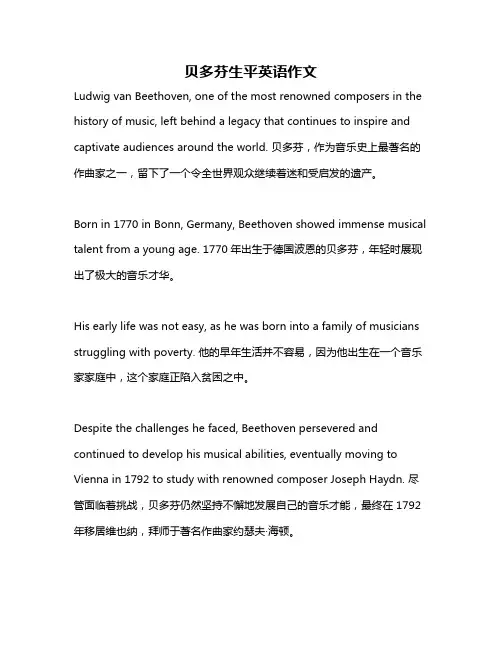
贝多芬生平英语作文Ludwig van Beethoven, one of the most renowned composers in the history of music, left behind a legacy that continues to inspire and captivate audiences around the world. 贝多芬,作为音乐史上最著名的作曲家之一,留下了一个令全世界观众继续着迷和受启发的遗产。
Born in 1770 in Bonn, Germany, Beethoven showed immense musical talent from a young age. 1770年出生于德国波恩的贝多芬,年轻时展现出了极大的音乐才华。
His early life was not easy, as he was born into a family of musicians struggling with poverty. 他的早年生活并不容易,因为他出生在一个音乐家家庭中,这个家庭正陷入贫困之中。
Despite the challenges he faced, Beethoven persevered and continued to develop his musical abilities, eventually moving to Vienna in 1792 to study with renowned composer Joseph Haydn. 尽管面临着挑战,贝多芬仍然坚持不懈地发展自己的音乐才能,最终在1792年移居维也纳,拜师于著名作曲家约瑟夫·海顿。
It was during his time in Vienna that Beethoven began to make a name for himself as a composer, with works such as his First and Second Symphonies earning him recognition in musical circles. 在维也纳的时期,贝多芬开始以作曲家的身份打响了名声,他的第一交响曲和第二交响曲等作品让他在音乐界获得了认可。
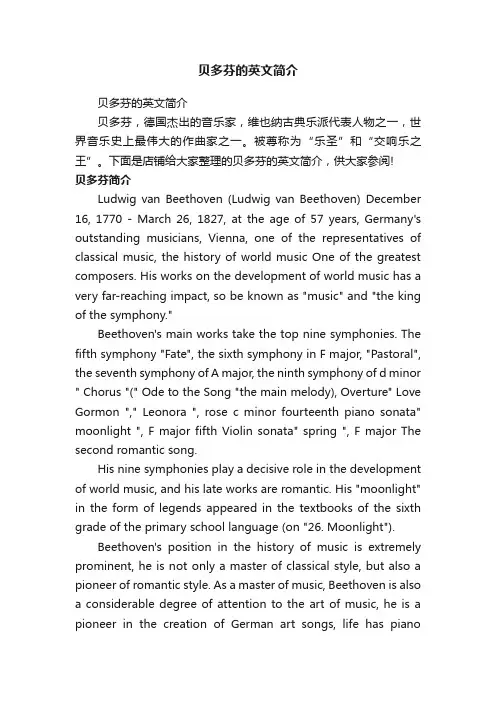
贝多芬的英文简介贝多芬的英文简介贝多芬,德国杰出的音乐家,维也纳古典乐派代表人物之一,世界音乐史上最伟大的作曲家之一。
被尊称为“乐圣”和“交响乐之王”。
下面是店铺给大家整理的贝多芬的英文简介,供大家参阅!贝多芬简介Ludwig van Beethoven (Ludwig van Beethoven) December 16, 1770 - March 26, 1827, at the age of 57 years, Germany's outstanding musicians, Vienna, one of the representatives of classical music, the history of world music One of the greatest composers. His works on the development of world music has a very far-reaching impact, so be known as "music" and "the king of the symphony."Beethoven's main works take the top nine symphonies. The fifth symphony "Fate", the sixth symphony in F major, "Pastoral", the seventh symphony of A major, the ninth symphony of d minor " Chorus "(" Ode to the Song "the main melody), Overture" Love Gormon "," Leonora ", rose c minor fourteenth piano sonata" moonlight ", F major fifth Violin sonata" spring ", F major The second romantic song.His nine symphonies play a decisive role in the development of world music, and his late works are romantic. His "moonlight" in the form of legends appeared in the textbooks of the sixth grade of the primary school language (on "26. Moonlight").Beethoven's position in the history of music is extremely prominent, he is not only a master of classical style, but also a pioneer of romantic style. As a master of music, Beethoven is also a considerable degree of attention to the art of music, he is a pioneer in the creation of German art songs, life has pianoaccompaniment of more than sixty songs, his artistic songs with a very rich expression of the way and form To show, express the feelings of all mankind. In the field of art songs made remarkable achievements. From 1896 began to feel the increasingly weak hearing, 1813 - 1817 Beethoven's creation is also a temporary decline; 1818 - 1827 Beethoven left ear deafness, health deterioration, forty-six Beethoven hearing has been completely lost.贝多芬个人经历Childhood experienceDecember 16, 1770, Beethoven was born in Bonn, Germany, poor families. The father is the mediocre choir of the house choir of the tenor, the mother is a much tortured palace chef's daughter. His grandfather was the chief of the Bonn Palace Orchestra. In his father's strict training, Beethoven revealed the music of talent, but Beethoven is often beaten by his father.Beethoven 4 years old will play the harpsichord, and get the reputation of the music prodigy; at the age of 5 suffering from otitis media; 8 years old began to perform on stage; 10 years old, he was the most famous music education in Prussia Beethoven's 11-year-old first "Piano Variations" at the age of 12; 12 years old by Nie Fei's recommendation, to Walterstein's palace band as organist assistant, then Beethoven's "music servant" The career began. 13-year-old Beethoven participated in the court band as an organist and an old pianist.Study experienceIn 1781 Beethoven followed the band conductor Kristian Gott Roberto Nefer learning piano and composer, Beethoven also with Franz Anton Reese learn violin, under the guidance of the new teacher makes Beethoven began to form their ownunique style of.In 1787 to Vienna, began to follow Mozart, Haydn and others to learn composition, at the beginning, Mozart wanted to see his ability to let him play music, Mozart heard his playing after the prediction of one day Beethoven will shake the world The Beethoven arrived in Vienna shortly after the death of his mother, he had to immediately back to Bonn. As a result of the family's drag, until the fall of 1792 his father died, he came to Vienna for the second time, but then Mozart is no longer alive.Beethoven also followed Schenck, Albrecht Borg and Salieri and others to learn. He was in Bonn through contacts with the intellectuals of Browning, access to many well-known professors, writers and musicians, and from them, by the "hurricane" trend of influence. His democratic ideology had matured in the years before the French Revolution, but grew rapidly in the revolutionary era. Beethoven during this period to create "prelude to F", two preludes and so on.Painful experienceBeethoven began to write the first symphony at the age of thirty, from 1796 began to feel the hearing is weakening, his love of life and the pursuit of art to overcome his personal pain and despair, suffering into He created the source of strength, he strangled the fate of the throat.He still painstakingly created "hero symphony"; "Hero Symphony" marks the Beethoven's state of mind turn, but also marks his creation of "heroic age" began.Beethoven's later stage in Vienna, as Europe is experiencing a period of severe political reaction, that is, Mettner's reactionary rule is particularly rampant.1818 - 1817 Beethoven's creation is also temporarily showinga decline; 1818 to 1827 Beethoven in the ears deaf, the deterioration of health, the spirit of torture, still with the giant perseverance created the "Ninth Symphony" Summed up his glorious, epic life, and show the good wishes of mankind.In 1823, Beethoven completed his last masterpiece in his life - the Ninth Symphony.In his later yearsForty-six-year-old Beethoven heard completely lost, still adhere to the music creation. In his later years, Beethoven created the last few string quartets.In 1826, Beethoven was unable to complete due to serious illness.In December 1826, Beethoven suffered from severe colds leading to pulmonary edema.March 26, 1827, Beethoven died in Vienna.On the day of his burial, all the schools were closed for mourning, twenty thousand people attended the funeral of Beethoven, and his tombstone was engraved with the inscription of the Austrian poet Greer Barty: "... when you stand in front of his coffin , Is not shy, but a kind of lofty feelings; we only have such a talent for him can say: he completed the great cause ... ... "贝多芬创作风格Beethoven's works are known for their heroic, dramatic and thoughtfulness. As he himself said: "music should make the human spirit burst out of the spark." For example, his most famous "fifth" fate "Symphony" in the "fate movement" describes the brutal fate of the struggle, and ultimately win The faith.He created a total of nine symphonies, one of the most well-known for the "third" hero "symphony", "fifth" fate "symphony","sixth" pastoral "symphony" and "ninth" chorus "symphony".His piano music works are known for his passion for boldness and contrast. Piano sonata plays an important role in his work, not only reflects the evolution of his personal music creation style, but also indicates the piano music from classicalism into the romantic process.Starting from the third movement of his second sonata, Beethoven replaced the small steps with Haydn and Mozart with a scherzo. Since then the structure of the sonata is: the first movement, the drama of conflict; the second movement, lyrical or contemplative adaption, used to express the complex inner emotional ups and downs; third movement, small step, Beethoven replaced with scherzo ; The fourth movement, rondo, warm, festive characteristics.The most famous of the sonata works is "warm", "sad", "moonlight", "dawn" and "storm" five.In Beethoven's later years, he also wrote six string quartets, which represent the "quartet of the B-Major". In the creation of vocal works, there are vocal divertimento "to the distant lover", Cantata "solemn mass" and other important works. One of his most important operas is "Ferdinand".Beethoven's work by the eighteenth century Enlightenment and the German Hurricane sudden movement of the impact of distinct personality, than the predecessors have made great progress. In music performance, he almost involved all the music genre at that time; greatly improved the performance of the piano, so that the symphonic drama effect; also make the symphony become a direct reflection of social change in the form of important music.Beethoven set the culmination of classical music, whileopening up the romantic music of the road, the development of world music has a pivotal role, known as the "music Saint".Beethoven's creative idea is broad, magnificent image, deep feelings, contrast, which makes him emphasis on the use and expansion of the sonata style; at the same time because of the rich and varied image, the use of the works in the sonata and have their own characteristics.Beethoven's other orchestral works include "Violin Concerto", five piano concertoes, two preludes, piano bands, chorus fantasy, two violin tunes and band romance.His music, from that full of sunshine and youthful vitality behind the joy, often still can feel a pain, depression and sadness. Only Beethoven, he is not only angry against the feudal system of autocracy, and with his music called for people to fight for freedom and happiness.Beethoven in addition to absorb the traditional classical sonata structure reasonable ingredients, but also in their own creation to be greater innovation:The use of the primerRead the works of classical masters, from Haydn, Mozart to Crowe, Klemen Mentor, etc., their works are often straight to the point, straightforward meaning, the introductory part is often omitted. Only Beethoven, he gives the primer a new meaning, just like a concert prelude or opera prelude, the primer is often as a preface or a relatively independent part of the music content is briefly summarized, and implied, inspired, transition, description and so on. Such as "warm" third movement 1-19 section of the introduction, "Sorrow" the first movement of the 1-10 section of the introduction, the rise of the fourth anniversary of the V verse Sonata piano sonatas 1-4 section of theintroduction and so on.The presentation department is not repeatedWe know that in the analysis of classical sonata presentation department, often will find the first repeated mark, the first repeated before the mark for all the presentation. But in the "warm", Beethoven has this repeated mark omitted, it can not be said that Beethoven's "classical frame" betrayal and innovation. Of course, the presentation of the song is not repeated mainly music content development results.The part of the connection, the expansion and the end of the full independenceBeethoven's work, "start" is only relatively unfolded, often "symbolic", and "connection" and "end" is a mere identity in the work, there is no independence Meaning, is transferred from the tone or tone, to "bridge" in the identity of the work of the secondary position; some simply put the expansion of the Department. Beethoven has given the expansion, the connection and the end of the new meaning, in space and art height, is predecessors can not. There is 71 steps (65-135) in the first movement of the "passion", the connection is 20 (16-35) and the end is 15 (51-65). While the third movement of the expansion of the Department has 94 knots as much as (118-211), the connection is accounted for 40 sections of the giant (36-75); and in this section to give the connection part of a certain degree of independence and more Strong melodic tendency.The endThe unprecedented development of the end is not only in the length of the elongation, and more valuable is that Beethoven still give the end of the relative independence of the meaning. "Passion" of the first movement ending 59 (that is 204-262), the third movement ending 54 (that is, 308-361). He often refers to the main part of the vice part of the music material, the tail for the mixed development, and to the end of the more specific Ad Ha. ("Warmth" the first part of the first part of the movement section 239), presto "passion" the third part of the third part of the movement section 308), as well as other terms such as piuallegro speed or intensity, so that the end becomes a relatively complete four-phrase structure of independence paragraph.。
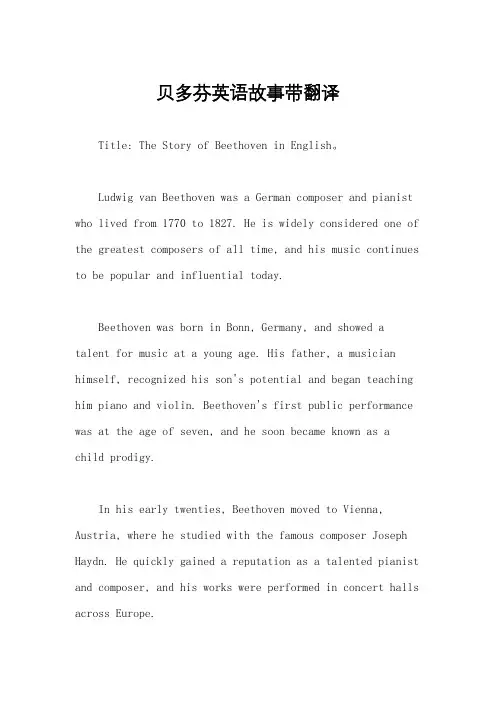
贝多芬英语故事带翻译Title: The Story of Beethoven in English。
Ludwig van Beethoven was a German composer and pianist who lived from 1770 to 1827. He is widely considered one of the greatest composers of all time, and his music continues to be popular and influential today.Beethoven was born in Bonn, Germany, and showed atalent for music at a young age. His father, a musician himself, recognized his son's potential and began teaching him piano and violin. Beethoven's first public performance was at the age of seven, and he soon became known as achild prodigy.In his early twenties, Beethoven moved to Vienna, Austria, where he studied with the famous composer Joseph Haydn. He quickly gained a reputation as a talented pianist and composer, and his works were performed in concert halls across Europe.Despite his success, Beethoven faced many challenges in his personal life. He suffered from hearing loss, which began in his late twenties and eventually left him completely deaf. This was a devastating blow for a musician who relied on his ears to create and perform music.Beethoven also struggled with relationships. He was known for his fiery temper and often had conflicts with family members, friends, and even other musicians. He never married, but he had several romantic relationships throughout his life.Despite these challenges, Beethoven continued to create some of the most beloved and influential music in history. His compositions spanned a wide range of genres, from symphonies and concertos to chamber music and solo piano works. Some of his most famous pieces include the Fifth Symphony, the Moonlight Sonata, and the Ninth Symphony, which includes the famous choral movement "Ode to Joy."Beethoven's music was groundbreaking in many ways. Heexpanded the traditional forms of classical music and experimented with new techniques and styles. He also infused his music with emotion and drama, creating powerful and moving works that continue to inspire listeners today.Beethoven died in Vienna in 1827 at the age of 56. He left behind a legacy of music that has influenced generations of composers and musicians. His work continues to be performed and celebrated around the world, and he remains one of the most beloved and revered figures in the history of classical music.。
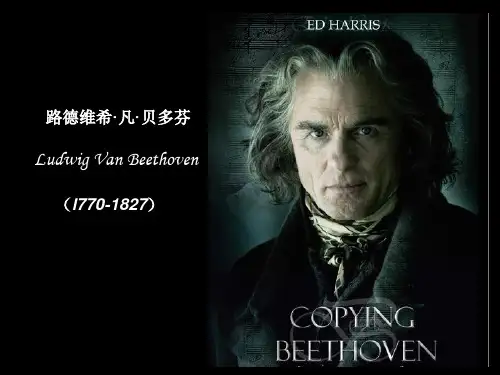
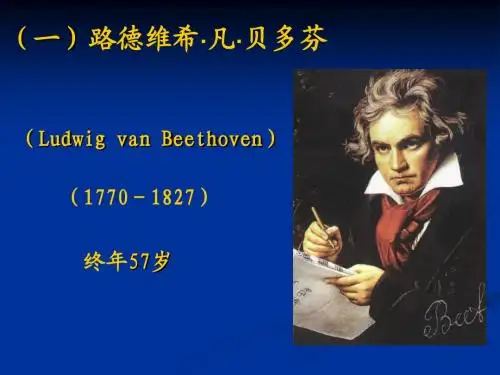



贝多芬简介英语作文Ludwig van Beethoven, a German composer and pianist, is widely regarded as one of the greatest musicians in history. He was born in Bonn, Germany in 1770 and lived until 1827. Beethoven's music bridged the Classical and Romantic eras, and his innovative compositions had a profound influence on the development of Western music.Beethoven showed exceptional musical talent at a young age and received training from renowned composers such as Joseph Haydn. He began his career as a pianist and gained fame for his virtuosic performances. However, Beethoven's true legacy lies in his groundbreaking compositions. He composed nine symphonies, including the iconic Symphony No.5 and Symphony No. 9, which features the famous "Ode to Joy" chorus.One of Beethoven's most remarkable achievements is his ability to compose music despite facing increasing deafness. He wrote some of his most famous works, including the Ninth Symphony, while completely deaf. Beethoven's music is known for its emotional depth, powerful expression, andinnovative use of form and structure.Beethoven's influence on subsequent generations of composers is immeasurable. His music has inspired countless artists and continues to be performed and celebrated around the world. Beethoven's legacy as a musical genius and innovator remains unparalleled in the history of classical music.贝多芬(Ludwig van Beethoven)是德国作曲家和钢琴家,被广泛认为是历史上最伟大的音乐家之一。
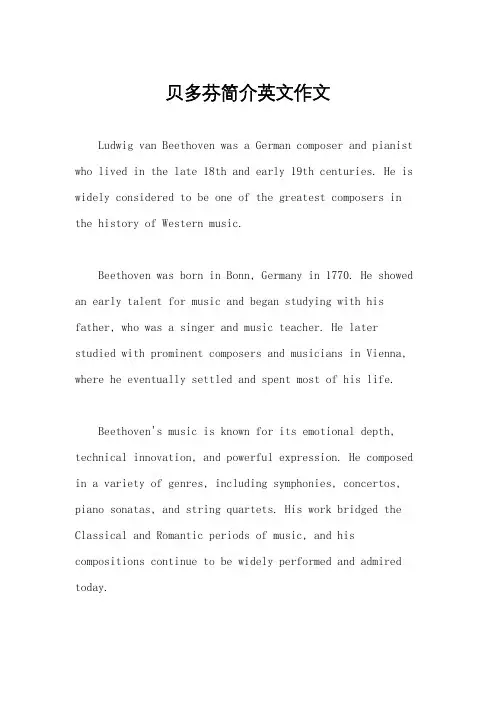
贝多芬简介英文作文Ludwig van Beethoven was a German composer and pianist who lived in the late 18th and early 19th centuries. He is widely considered to be one of the greatest composers in the history of Western music.Beethoven was born in Bonn, Germany in 1770. He showed an early talent for music and began studying with his father, who was a singer and music teacher. He later studied with prominent composers and musicians in Vienna, where he eventually settled and spent most of his life.Beethoven's music is known for its emotional depth, technical innovation, and powerful expression. He composed in a variety of genres, including symphonies, concertos, piano sonatas, and string quartets. His work bridged the Classical and Romantic periods of music, and his compositions continue to be widely performed and admired today.One of Beethoven's most famous works is his Ninth Symphony, which includes the "Ode to Joy" theme in itsfinal movement. This symphony is considered a masterpiece of Western music and has had a lasting impact on the classical music tradition.In addition to his musical achievements, Beethoven is also known for overcoming significant personal challenges. He began to lose his hearing in his late 20s and eventually became completely deaf. Despite this, he continued to compose and perform music, and his later works are seen as some of his most profound and innovative.Beethoven's legacy extends beyond his music, as he is often seen as a symbol of artistic struggle and triumph. His life and work continue to inspire musicians and music lovers around the world, and his impact on the development of Western music cannot be overstated.。
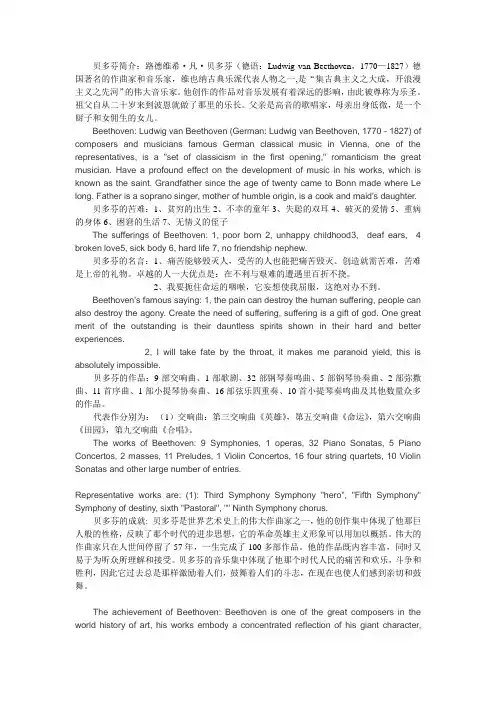
贝多芬简介:路德维希·凡·贝多芬(德语:Ludwig van Beethoven,1770—1827)德国著名的作曲家和音乐家,维也纳古典乐派代表人物之一,是“集古典主义之大成,开浪漫主义之先河”的伟大音乐家。
他创作的作品对音乐发展有着深远的影响,由此被尊称为乐圣。
祖父自从二十岁来到波恩就做了那里的乐长。
父亲是高音的歌唱家,母亲出身低微,是一个厨子和女佣生的女儿。
Beethoven: Ludwig van Beethoven (German: Ludwig van Beethoven, 1770 - 1827) of composers and musicians famous German classical music in Vienna, one of the representatives, is a "set of classicism in the first opening," romanticism the great musician. Have a profound effect on the development of music in his works, which is known as the saint. Grandfather since the age of twenty came to Bonn made where Le long. Father is a soprano singer, mother of humble origin, is a cook and maid's daughter.贝多芬的苦难:1、贫穷的出生2、不幸的童年3、失聪的双耳4、破灭的爱情5、重病的身体6、困窘的生活7、无情义的侄子The sufferings of Beethoven: 1, poor born 2, unhappy childhood3, deaf ears, 4 broken love5, sick body 6, hard life 7, no friendship nephew.贝多芬的名言:1、痛苦能够毁灭人,受苦的人也能把痛苦毁灭。
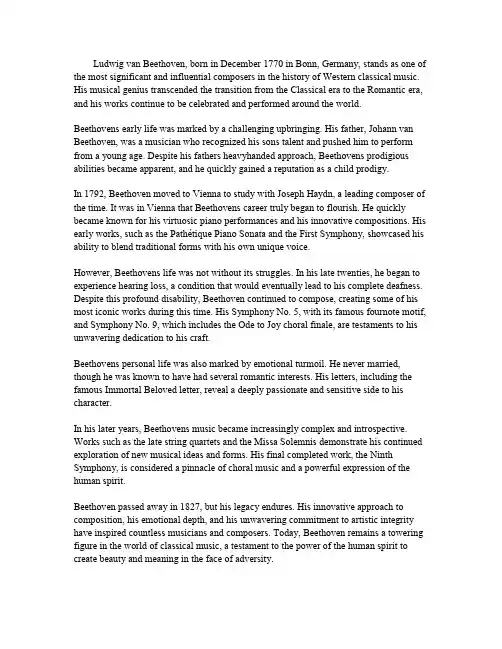
Ludwig van Beethoven, born in December 1770 in Bonn, Germany, stands as one of the most significant and influential composers in the history of Western classical music. His musical genius transcended the transition from the Classical era to the Romantic era, and his works continue to be celebrated and performed around the world.Beethovens early life was marked by a challenging upbringing. His father, Johann van Beethoven, was a musician who recognized his sons talent and pushed him to perform from a young age. Despite his fathers heavyhanded approach, Beethovens prodigious abilities became apparent, and he quickly gained a reputation as a child prodigy.In 1792, Beethoven moved to Vienna to study with Joseph Haydn, a leading composer of the time. It was in Vienna that Beethovens career truly began to flourish. He quickly became known for his virtuosic piano performances and his innovative compositions. His early works, such as the Pathétique Piano Sonata and the First Symphony, showcased his ability to blend traditional forms with his own unique voice.However, Beethovens life was not without its struggles. In his late twenties, he began to experience hearing loss, a condition that would eventually lead to his complete deafness. Despite this profound disability, Beethoven continued to compose, creating some of his most iconic works during this time. His Symphony No. 5, with its famous fournote motif, and Symphony No. 9, which includes the Ode to Joy choral finale, are testaments to his unwavering dedication to his craft.Beethovens personal life was also marked by emotional turmoil. He never married, though he was known to have had several romantic interests. His letters, including the famous Immortal Beloved letter, reveal a deeply passionate and sensitive side to his character.In his later years, Beethovens music became increasingly complex and introspective. Works such as the late string quartets and the Missa Solemnis demonstrate his continued exploration of new musical ideas and forms. His final completed work, the Ninth Symphony, is considered a pinnacle of choral music and a powerful expression of the human spirit.Beethoven passed away in 1827, but his legacy endures. His innovative approach to composition, his emotional depth, and his unwavering commitment to artistic integrity have inspired countless musicians and composers. Today, Beethoven remains a towering figure in the world of classical music, a testament to the power of the human spirit to create beauty and meaning in the face of adversity.。
音乐家贝多芬的资料中文名:路德维希·凡·贝多芬外文名:LudwigvanBeethoven别名:贝多芬国籍:德国民族:日耳曼民族出生地:波恩出生日期:1770年12月16日逝世日期:1827年3月26日信仰:基督新教身高/体重:1.57米/50公斤1770年12月16日,贝多芬出生于德国波恩的贫穷家庭。
父亲是当地碌碌无为的宫廷唱诗班的男高音歌手,母亲是一名倍受生活折磨的宫廷大厨师的女儿。
他的祖父是波恩宫廷乐团的乐长。
在父亲的严格训练下,贝多芬显露出了音乐上的才华,但贝多芬常常遭到父亲的打骂。
贝多芬的作品以富有英雄性、戏剧性和思想性而闻名。
正如他自己所说:“音乐应当使人类的精神爆发出火花。
”例如他最著名的《第五“命运”交响曲》中的“命运动机”描写了与残酷的命运斗争,并最终获得胜利的信念。
他一共创作了9部交响曲,其中最为人熟知的为《第三“英雄”交响曲》、《第五“命运”交响曲》、《第六“田园”交响曲》和《第九“合唱”交响曲》。
他的钢琴音乐作品则以热情豪放和对比强烈的交响性著称。
钢琴奏鸣曲在他的作品中占有重要的地位,不但体现了他个人音乐创作风格的演变,而且预示了钢琴音乐从古典主义进入浪漫主义的过程。
从他的第二奏鸣曲第三乐章开始,贝多芬用谐谑曲代替了海顿和莫扎特使用的小步舞曲。
自此奏鸣曲的结构为:第一乐章,戏剧冲突性;第二乐章,抒情或沉思性的慢板,用来表达复杂的内心情感起伏;第三乐章,小步舞曲,贝多芬用谐谑曲替代;第四乐章,回旋曲,热烈、节庆性特征。
在奏鸣曲作品中最著名的是《热情》、《悲怆》、《月光》、《黎明》和《暴风雨》五首。
在贝多芬的晚年,他还写了六首弦乐四重奏,其中代表作为《降B大调弦乐四重奏》。
在声乐作品创作方面,有声乐套曲《致远方的爱人》、康塔塔《庄严弥撒》等重要作品。
他的最重要的一部歌剧为《费黛里奥》。
贝多芬的作品受十八世纪启蒙运动和德国狂飙突进运动的影响,个性鲜明,较前人有了很大的发展。
介绍音乐天才贝多芬英语作文Ludwig van Beethoven was a musical genius whose compositions have left an indelible mark on the world of classical music. Born in 1770 in Bonn, Germany, Beethoven's early life was marked by hardship and adversity, but his unwavering dedication to his craft and his unparalleled talent would ultimately propel him to become one of the most revered composers of all time.Beethoven's musical journey began at a young age, as he was exposed to the art of music from a very early age. His father, Johann van Beethoven, was a court musician and a strict disciplinarian who insisted that his son receive rigorous musical training. Beethoven's early years were filled with intense practice and study, as he honed his skills on the piano and the violin.Despite the demanding nature of his training, Beethoven's talent and passion for music quickly became evident. By the age of 12, he had already composed his first work, a set of variations on a theme by an obscure composer. This early success was a harbinger of the greatness that was to come, as Beethoven went on to create some of the most iconic and influential works in the history of classical music.One of the most remarkable aspects of Beethoven's career was his ability to adapt and evolve as a composer. Throughout his life, he experimented with different styles and techniques, constantly pushing the boundaries of what was possible in music. His early works, such as the "Pathétique" and "Moonlight" sonatas, were characterized by a sense of drama and emotion that was unparalleled in the classical tradition.As Beethoven's career progressed, his music became increasingly complex and ambitious. His symphonies, in particular, are considered to be among the greatest works of classical music ever composed. The "Eroica" Symphony, for example, is a monumental work that captures the grandeur and power of the human spirit. The "Fifth Symphony," with its iconic opening motif, is perhaps Beethoven's most famous and recognizable composition, and has become a symbol of human resilience and determination.But Beethoven's genius was not limited to his compositions. He was also a virtuoso pianist and a tireless advocate for the rights of artists. He fought against the constraints of the aristocratic system that dominated the music industry in his time, and he insisted on the creative freedom to compose works that reflected his own unique vision and perspective.One of the most remarkable aspects of Beethoven's life was hisability to overcome the many challenges that he faced. Throughout his career, he struggled with a debilitating hearing loss that ultimately left him completely deaf. Yet, despite this seemingly insurmountable obstacle, Beethoven continued to compose some of his most innovative and groundbreaking works.The "Ninth Symphony," for example, is a testament to Beethoven's unwavering determination and his commitment to his art. Composed when he was completely deaf, the symphony is a profound and deeply moving work that celebrates the power of human connection and the triumph of the human spirit. The final movement, which features the famous "Ode to Joy" melody, is a stirring and uplifting celebration of the universal brotherhood of humanity.Beethoven's legacy as a composer and a cultural icon is truly immeasurable. His works have inspired generations of musicians and artists, and his influence can be felt in every corner of the classical music world. From the sweeping grandeur of his symphonies to the intimate and introspective beauty of his piano sonatas, Beethoven's music has the power to move and inspire listeners of all ages and backgrounds.But Beethoven's legacy extends far beyond the realm of music. He was a deeply philosophical thinker who grappled with the fundamental questions of human existence. His music, with itsthemes of struggle, triumph, and the search for meaning, has become a touchstone for those who seek to understand the human condition.In many ways, Beethoven's life and work can be seen as a metaphor for the human experience itself. His ability to overcome seemingly insurmountable obstacles, to push the boundaries of what was possible, and to create works of enduring beauty and significance, is a testament to the power of the human spirit.Today, Beethoven's music continues to be celebrated and revered around the world. His compositions are performed in concert halls and recital venues, and his influence can be felt in the work of countless contemporary composers and musicians. And for those who have the privilege of experiencing Beethoven's music firsthand, the impact is truly profound – a testament to the enduring power of art to touch the human soul.。
中文名:贝多芬英文名: Beethoven, Ludwig van生于: 15 / 12 / 1770卒于: 26 / 03 / 1827国籍:德国乐派:古典乐派贝多芬简介贝多芬1770年12月16日出生于德国莱茵河畔的波昂一个有音乐背景的家庭,是西洋音乐史上少有的伟大的音乐家,被誉为「乐圣」。
祖先为荷兰人,他家族是音乐世家,祖父是波昂宫庭乐长,爸爸于科隆选帝宫廷礼拜堂担任男高音歌手及宫廷乐长的职务,贝多芬有2个年幼的弟弟。
贝多芬年幼时由他爸爸教他弹琴,他的音乐学习进步很快,当他发现贝多芬的音乐天才,就急于将小贝多芬培养成音乐神童,强迫他长时间练琴。
但贝多芬真正的启蒙老师,却是宫庭乐长倪富(1748-1798) 他是来自莱比锡的著名作曲家,除了钢琴和管风琴外,还教贝多芬作曲。
贝多芬8岁时已公开演奏,13岁担任宫廷的助理管风琴师和中提琴手,并写出「依德雷斯主题奏曲」,14岁在宫廷演奏管风琴。
1789年,贝多芬17岁被送往当时欧洲的音乐中心---维也纳学习音乐,并结识仰慕的莫扎特(Wolfgong Amadeus Mozart),后因妈妈患上肺结核病危,匆匆赶回波昂,返国后在布鲁宁一家的支持下,入波昂大学为旁听生。
妈妈过身后,由于爸爸酗酒,他要在教堂和剧院的乐队担任中提琴手,以赚取家庭年生活费,照顾爸爸及2位年幼的弟弟。
1792年(22岁) 贝多芬正式移居维也纳,先与有「交响乐之父」之称的海顿(Joseph Haydn)、阿布雷兹亲王、萨里耶瑞等大师学习,之后在罗勃科维兹亲王、鲁道夫大公、金斯基亲王等贵族的赞助下,逐渐在维也纳尊定了名声,在维也纳贝多芬很快便成为出色的钢琴家,特别是他即兴演奏的本领更受人爱戴。
1800年左右,贝多芬发现听觉衰退,并且越来越严重,直至1812年(42岁) 完全失聪。
贝多芬1827年3月26日逝世于维也纳,终年57岁,死因是贝多芬不小心染上感冒,引发长年来的多种症病而死亡。
贝多芬人物传记英文作文英文回答:Ludwig van Beethoven was a German composer, pianist and one of the most influential figures in Western music. He lived from 1770 to 1827 and his works are still performed and enjoyed by people all over the world.Beethoven was born in Bonn, Germany. His father was a singer and his mother was a cook. He began studying the piano at a young age and showed great talent. By the age of 12, he was already performing in public.In 1792, Beethoven moved to Vienna to study with Joseph Haydn. He quickly became one of the most popular composers in the city. In 1796, he began to lose his hearing, which had a profound impact on his life. Despite his deafness, he continued to compose and his music became even more powerful and moving.Beethoven's most famous works include the Ninth Symphony, the Fifth Symphony and the Moonlight Sonata. He also wrote many sonatas, concertos and chamber music. His music is known for its emotional depth, its use ofinnovative harmonies and rhythms, and its powerful melodies.Beethoven is considered one of the greatest composersof all time. His music has had a lasting influence on Western music and continues to be performed and enjoyed by people all over the world.中文回答:贝多芬人物传记。